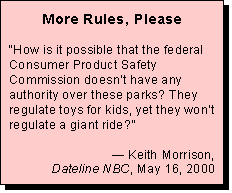 |
||||||||||||||||||||||||
|
||||||||||||||||||||||||
 |
||||||
|
||||||
 |
||||||||||||||||||
|
||||||||||||||||||
 |
|||||||||
|
 |
||||||||||||||||||||||||
|
||||||||||||||||||||||||
 |
||||||||||||||||||||||||
|
||||||||||||||||||||||||
|
What The Media Tell
Americans About Free Enterprise 
Odds Are, Regulations Demanded by Dateline NBC Won’t Help Anyone but Bureaucrats According to the National Geographic Society, about 80 people are killed by lightning strikes each year in the United States. According to NBC’s Keith Morrison, in a report he prepared for the May 16 Dateline NBC, far fewer people (six, to be exact) died in amusement park accidents in 1999. But that makes it the worst year in recent memory so, says Dateline, it’s time to bring on the bureaucrats. "Even though the odds of being hurt on an amusement park ride are very long," Morrison said, "it is perhaps not surprising that some people have begun to ask if this is an industry in need of tighter regulation."
There are about 300 million visits to fixed-site amusement parks each year, according to the International Association of Amusement Parks and Attractions (IAAPA), and deaths on rides at those parks have averaged two per year over the last 20 years, or approximately one fatality per 150,000,000 visits. In comparison, odds of winning the recent multi-state Big Game lottery jackpot were one in 76,275,360. According to the IAAPA, in 1998 more people were injured while fishing or golfing than while riding on amusement park rides. Dateline focused on a 15-year-old girl who was killed in Texas in 1998 when the lap bar meant to hold her, her brother, and another youngster inside the roller coaster broke off and they were thrown out of the car and into a retaining wall. The same ride had been cited for problems by California safety officials before its owners moved it to Texas. "People had been injured on it before," George Lane, the girl’s father, told Morrison. "Why was it allowed to keep operating without going through some major overhaul, you know? There’s just not enough safety regulations in place." Later, Morrison quizzed an amusement park inspector, Ken Martin. "How is it possible that the federal Consumer Product Safety Commission doesn’t have any authority over these parks? They regulate toys for kids, yet they won’t regulate a giant ride?" "Well, Keith," Martin replied, "the consumers have not come forward and said ‘we want the parks regulated.’ You’re right, we regulate car seats, baby cribs, and all the important things in our lives." But Lane’s daughter was killed on a coaster which was part of a mobile carnival that’s supposedly already within the CPSC’s jurisdiction. The ride had been inspected the day of the accident, and had been declared safe. An hour before the accident, other riders had told the operator that their lap bar had broken off. After an investigation, both the ride’s owner and the inspection company were charged with negligent homicide, the first time criminal charges have been brought in an amusement park death, according to Dateline. Some level of risk is unavoidable in a free society, and -- the Lane family’s tragedy notwithstanding -- it’s not clear that there’s a real problem with amusements parks or, if there is a problem, that Markey’s bill would do anything more than spend more money and empower more bureaucrats. It’s too bad Dateline just doesn’t get it.
Home | News Division
| Bozell Columns | CyberAlerts |
||||




 The
impetus for the Dateline story seems to have been
congressional hearings on a bill championed by Democratic Rep. Ed
Markey of Massachusetts. "The National Amusement Park Safety Act"
would give the Consumer Product Safety Commission (CPSC) the same
jurisdiction over fixed-site amusement parks (big parks in permanent
locations, like Disney World and Six Flags) that it currently
exercises over mobile rides (such as carnivals which visit smaller
towns for short periods of time), plus additional appropriations of
$500,000 annually to carry out the broadened mandate.
The
impetus for the Dateline story seems to have been
congressional hearings on a bill championed by Democratic Rep. Ed
Markey of Massachusetts. "The National Amusement Park Safety Act"
would give the Consumer Product Safety Commission (CPSC) the same
jurisdiction over fixed-site amusement parks (big parks in permanent
locations, like Disney World and Six Flags) that it currently
exercises over mobile rides (such as carnivals which visit smaller
towns for short periods of time), plus additional appropriations of
$500,000 annually to carry out the broadened mandate.